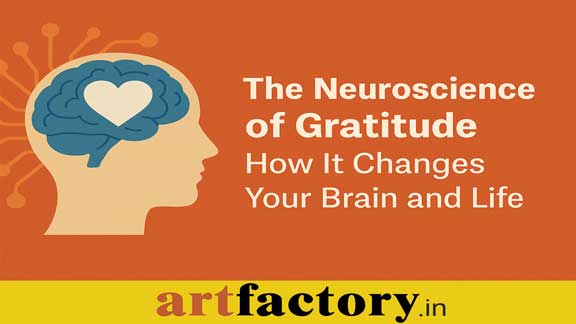
The Neuroscience of Gratitude: How It Changes Your Brain and Life
Gratitude Is More Than a Feeling—It’s a Brain-Changer
Have you ever wondered why practicing gratitude feels so good? Science has an answer. Gratitude doesn’t just improve your mood—it physically changes the structure and function of your brain. Welcome to the fascinating world of neuroscience and gratitude.
In this blog, we’ll dive into the science behind gratitude, how it transforms your brain, boosts mental health, and improves your overall life. If you want to live happier, healthier, and more connected, keep reading—because the benefits of gratitude are literally life-changing.
What Is Gratitude? A Neuroscientific Perspective
Gratitude is the act of recognizing and appreciating the good things in your life. But in the brain, it triggers much more than warm feelings—it lights up reward pathways and activates neurochemicals that create lasting change.
Key brain areas involved in gratitude:
Prefrontal Cortex: Decision-making and emotional regulation
Anterior Cingulate Cortex: Empathy and emotion
Ventral Tegmental Area (VTA): Dopamine production and reward
Amygdala: Processes fear and emotions
When you practice gratitude, these areas of the brain start to rewire, making it easier to feel thankful and optimistic—even in challenging situations.
How Gratitude Physically Changes Your Brain
1. Increases Dopamine and Serotonin Production
Gratitude activates the brain’s reward system. Just thinking about things you're grateful for boosts the production of dopamine (the feel-good hormone) and serotonin (the mood stabilizer). Over time, this rewiring leads to a more naturally positive outlook.
2. Reduces Stress and Cortisol Levels
Consistent gratitude practice is linked to lower cortisol levels, the hormone responsible for stress. This can lead to better sleep, lower blood pressure, and a stronger immune system.
3. Strengthens Neural Pathways
Gratitude enhances neuroplasticity—the brain’s ability to form new connections. This means you’re literally training your brain to focus more on the positive aspects of life, making gratitude a mental habit.
4. Improves Emotional Resilience
Gratitude helps the amygdala calm down, reducing anxiety and fear. Over time, grateful people become more emotionally resilient, bouncing back from setbacks faster and with less emotional damage.
Scientific Studies That Prove Gratitude Changes the Brain
✨ Study 1: University of California, Berkeley (2016)
A group of participants wrote gratitude letters weekly for 3 weeks. Brain scans showed stronger activity in the medial prefrontal cortex—a region associated with learning and decision-making—even 3 months later.
✨ Study 2: Indiana University (2015)
Participants who practiced gratitude showed lasting changes in brain activity. The more they expressed gratitude, the more their brain’s reward systems were activated, especially the ventromedial prefrontal cortex.
✨ Study 3: NIH & University of Utah
People who expressed more gratitude had better cardiovascular health, lower inflammation, and healthier heart rhythms—all linked to a calmer, less reactive brain.
Mental Health Benefits of Gratitude
Gratitude isn’t just about feeling good—it has a clinical impact on mental health. Practicing gratitude regularly can:
Lower symptoms of depression and anxiety
Reduce feelings of envy, resentment, and frustration
Increase empathy, patience, and overall happiness
Improve sleep quality and reduce insomnia
Create a deep sense of life satisfaction and meaning
Daily Gratitude Practices That Rewire Your Brain
Here are some easy yet powerful ways to cultivate gratitude:
✅ Gratitude Journaling
Write down 3 things you're grateful for every morning or night. This simple act increases serotonin levels and builds a positive neural loop.
✅ Gratitude Meditation
Spend 5–10 minutes daily visualizing people or moments you're thankful for. This enhances connectivity in your prefrontal cortex.
✅ Gratitude Letters
Write a heartfelt letter to someone who positively impacted your life—even if you never send it. This boosts your brain’s empathy and reward centers.
✅ Verbal Acknowledgment
Say “thank you” out loud more often. When you express appreciation, your brain rewards you with dopamine and oxytocin—hormones that deepen connection and trust.
Conclusion: Gratitude Rewires Your Brain for a Better Life
The neuroscience of gratitude proves that saying “thank you” isn’t just good manners—it’s a powerful, scientifically backed practice that improves your brain and transforms your life.
So if you want to become more positive, peaceful, and productive, start practicing gratitude today. Your brain—and your life—will never be the same.
✅ FAQs: The Neuroscience of Gratitude
Q1. How long does it take for gratitude to rewire the brain?
A: Studies show that as little as 3 weeks of daily gratitude practice can lead to noticeable changes in brain activity.
Q2. Can gratitude improve mental health disorders like depression?
A: Yes. Gratitude has been linked to reduced symptoms of depression and anxiety through positive rewiring of the brain.
Q3. Does gratitude work even if I don’t feel it deeply?
A: Yes. The act of practicing gratitude, even when forced at first, still activates the brain’s reward system and builds new neural pathways over time.

Comments : (0)